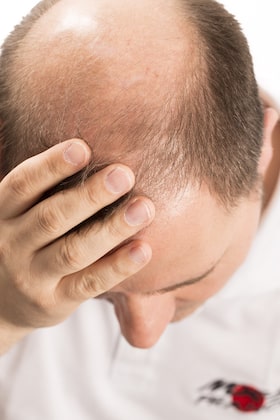Hair Loss – Mental Health Impact Examined
The phrase “bad hair day” has come to mean a day where nothing goes right when trying to style the hair on the scalp. While a less than desired hairstyle might only last a day or two for some people, a “bad hair day” can be a long-lasting issue for someone experiencing hair loss. Let’s examine the impact hair loss can have on the mental health and self-image of a person.
Hair Loss – Psychological Impact
Many people consider their hair to be a main element of their appearance which means thinning hair or bald spots on the scalp can have a negative impact on their self-confidence and even cause them to change their behavior around others.
Even if a patent decides to visit a hair transplant surgeon for a consultation appointment, it can often be difficult for a person to discuss their hair loss and the impact it is having on their mental health. They might be very unhappy and can often be angry or defensive when discussing their hair loss. The hesitation to discuss their hair loss applies to both men and women.
Hair Loss – Why it Happens and How it Can Impact a Person
 The loss of hair on the scalp can be a genetic issue and it can also be caused by certain medications, an infection, or trauma to the scalp. In addition, issues with hormonal imbalances and autoimmune conditions can also result in hair loss.
The loss of hair on the scalp can be a genetic issue and it can also be caused by certain medications, an infection, or trauma to the scalp. In addition, issues with hormonal imbalances and autoimmune conditions can also result in hair loss.
No matter the cause of the thinning or balding sections on the scalp, hair loss can cause a person to experience serious distress and they might even begin to experience some level of depression.
Another reason a person experiencing hair loss might find their condition to be frustrating is the fact that it can sometimes be difficult to find the right information online for their specific needs. There is a lot of information online about the topic of hair loss. Some of it is posted by experienced and board-certified doctors with a medical background in diagnosing and treating hair loss. There is also a good amount of information from people pretending to be doctors or others who are simply sharing their opinion about the topic as opposed to having a personal connection or experience with hair restoration treatments. The task of telling the difference between fact and fiction about hair loss treatments is not always an easy one.
Hair Loss – How to Treat its Mental Impact
It is important to remember that, just like a medical treatment for the loss of hair on the scalp, there is not a “one size fits all” or generic approach to treating the mental impact of the condition on a person. The loss of hair can have a major impact on the self-worth of a person and make them not willing to attend work or social events because of the appearance of their scalp. As a result, psychological therapy can sometimes be a recommended component of the management of hair loss.
Depending on the reason for the hair loss, there are also medical solutions that can address the issue of thinning hair and bald spots. One of the most popular treatments is a hair transplant that can give a person a healthier and fuller head of hair. During a Follicular Unit Extraction (FUE) hair transplant, a surgeon will take hair grafts from the donor area of the scalp and place them into the targeted area of the scalp. The hair grafts usually come from the back and sides of the head as the hair in this area has proven to be resistant to the balding process.
In an FUE procedure, the hair grafts are removed individually from the donor area and then implanted into premade sites (incisions) on the scalp. The hair that is transplanted is strategically placed by the surgeon so it will match the natural curvature of the native hair of the patient.
The surgeon can do more than perform the actual medical procedure on the scalp of the patient. The doctor can also walk the patient through the procedure and let them know what will happen during the surgery and what they can expect during the recovery process. By discussing the procedure and explaining it in detail, any anxiety and emotional turmoil regarding the treatment of their hair loss can be reduced thanks to medically accurate information and the guiding hand of a professional surgeon.
Although it might sound easy for anyone to say, the loss of hair on the scalp does not make a person less than they were when they had a full and healthy head of hair. The ability to improve the appearance of the scalp and the self-image of a person makes a hair transplant a solution for hair loss that can have a positive impact on both the physical appearance of a person and their emotional state as well.